Ken MacLeod's Blog, page 9
May 25, 2014
Reach for Infinity
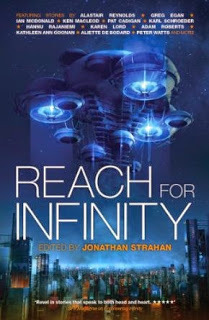 I have a short story in Jonathan Strahan's new anthology, Reach for Infinity, which is now available for pre-order (US/UK). The third in a well-received hard-SF series (preceded by Engineering Infinity and Edge of Infinity), this anthology deals with the next stages of humanity's expansion into the Solar system.
I have a short story in Jonathan Strahan's new anthology, Reach for Infinity, which is now available for pre-order (US/UK). The third in a well-received hard-SF series (preceded by Engineering Infinity and Edge of Infinity), this anthology deals with the next stages of humanity's expansion into the Solar system. Contents:
Introduction by Jonathan Strahan
"Break My Fall" by Greg Egan
"The Dust Queen" by Aliette de Bodard
"The Fifth Dragon" by Ian McDonald
"Kheldyu" by Karl Schroeder
"Report Concerning the Presence of Seahorses on Mars" by Pat Cadigan
"Hiraeth: A Tragedy in Four Acts" by Karen Lord
"Amicae Aeternum" by Ellen Klages
"Trademark Bugs: A Legal History" by Adam Roberts
"Attitude" by Linda Nagata
" Invisible Planets" by Hannu Rajaniemi
"Wilder Still, the Stars" by Kathleen Ann Goonan
"'The Entire Immense Superstructure': An Installation" by Ken MacLeod
"In Babelsberg" by Alastair Reynolds
"Hotshot" by Peter Watts
As its title suggests, my own contribution is a little more experimental in form and content than most of my short stories, and I'll be interested to see what readers think of it.
Reviews of the collection here (from which I lifted the contents list) and here.
Published on May 25, 2014 06:27
May 21, 2014
Reviews of Descent
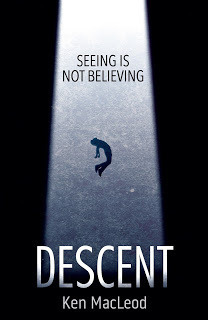 My novel Descent (Amazon / Orbit / Guardian) has by now gathered a fair crop of reviews. There's one in the current issue of Interzone which I haven't seen yet but fingers crossed.
My novel Descent (Amazon / Orbit / Guardian) has by now gathered a fair crop of reviews. There's one in the current issue of Interzone which I haven't seen yet but fingers crossed. The Financial Times called it 'politically engaged, brimming with smart ideas and shot through with a mordant wit.' From a newspaper on the other side of the class struggle, Matt Coward in the Morning Star says: 'MacLeod’s fiction is always — above all else — humanist and this vivacious and constantly entertaining novel strongly suggests that we would all do better learning to recognise love and friendship when they are staring us in the face, rather than getting ensnared in the ultimately barren webs of the conspiracy mongers.'
SFX: 'A big-hearted, richly comic and, for all it often plays scenes for laughs, deeply moral and serious novel.'
Niall Alexander at Tor.com (and reprinted, if that's the word, at The Speculative Scotsman): 'In both senses—as a skiffy conspiracy thriller and an approachable coming-of-age confessional—Descent is a success in large part thanks to its fittingly conflicted central character ... [rendered] so exceptionally that readers will root for him to come good rather than hope to see him suffer for the sometimes disgusting things he does in service of his obsession.'
Edinburgh blogger Tychy: 'Descent is in fact an ambitious comic novel. It deserves to be thrust before the general reader, rather than being fostered upon a certain clique or market ... a lavish satirical novel, and dazzling in the scope of its moral application.'
SF critic Paul Kincaid at Bull Spec: 'The biggest book of the month has to be Descent by Ken MacLeod (Orbit). Like his previous novel, the Clarke-shortlisted Intrusion, it’s a near-future political novel about the intrusion of shadowy authority figures into ordinary life. This time it starts with what seems to be an encounter with a UFO, but it soon becomes more about issues of belief and control. It has to be said that I don’t think this is anywhere near as good as Intrusion, but as is typical of Ken MacLeod it is a gripping story that forces you to think about some very complex issues.'
Book-bloggers, whether individual or collaborative, have become important enough to actually get sent review copies. One lively and wide-ranging collaborative site is Upcoming4me. They often ask authors to give 'the story behind the story' and mine is here. Their review is here: 'In fact, this is not a novel about alien abductions but about the mystery of Ryan and his fall into confusion. Hence, the descent.'
For Winter Nights has a similar take: 'Ryan enthusiastically embarks on his descent into confusion, dark corners and suspicion. Luckily, his path is much more entertaining for us than it is for Ryan.'
Other online reviews from A Universe in Words, Kafka's Cage, Nudge (also at The Forgotten Geek), The Earthian Hivemind, Concatenation ('This is X-Files meets William Gibson doing a Kim Stanley Robinson; a very much hard to beat combination. Recommended.'), student newspaper York Vision ('It's political sci-fi, and good, original political sci-fi for that matter.'), and that by my friend and fellow Scottish SF writer Jack Deighton, are all in various ways insightful about the story and (to me) gratifying to read.
I was asked about the book and much else in an interview at The LA Review of Books, which was so wide-ranging and well-informed that I could use it as a FAQ. I've also talked about the book in podcast interviews conducted at Galactic Chat by Helen Stubbs and The Scottish Book Trust by Ryan Van Winkle.
Just in, and to wrap up, long-standing left-wing blogger Phil writes: 'Ken's exploration of a world in foment as it segues from neoliberal depression to Keynesian expansion is absolutely flawless, and everything ties up with a little bit left to the reader's imagination.
Near future fiction is a tricky genre to pull off because real world developments habitually threaten speculation. Yet Ken's novels, even the stuff he published in the 90s, remain endlessly contemporary and just slightly beyond our time; out of reach but all the more tantalising for it. Descent is an excellent novel and an excellent way into Ken's works.'
Published on May 21, 2014 07:31
May 20, 2014
Upcoming events
This Friday, 23 May at 7.30 I'm at Dumbarton Library for a panel at the West Dunbartonshire literary festival Booked!, with Stuart Kelly and Farah Mendlesohn, celebrating Iain (M.) Banks. Stuart and Farah have written numerous reviews and critical articles on his books, and besides having known Iain personally they've each conducted in-depth interviews and shared public discussions with him.
Event details here: free but ticketed, tickets obtainable from any branch of West Dunbartonshire Libraries.
Next month, on Saturday 14 June, I'll be at Summerhall at 7 pm for Scottish PEN's 'Exploration of Dangerous Ideas' aka 'Freedom of Expression and Science Fiction', with the World Fantasy Award-winning Nigerian-American novelist Nnedi Okorafor. The event (free but ticketed) is chaired by Stuart Kelly.
Details and booking here.
Event details here: free but ticketed, tickets obtainable from any branch of West Dunbartonshire Libraries.
Next month, on Saturday 14 June, I'll be at Summerhall at 7 pm for Scottish PEN's 'Exploration of Dangerous Ideas' aka 'Freedom of Expression and Science Fiction', with the World Fantasy Award-winning Nigerian-American novelist Nnedi Okorafor. The event (free but ticketed) is chaired by Stuart Kelly.
Details and booking here.
Published on May 20, 2014 02:35
May 13, 2014
Scottish independence
I'm for a No vote in the Scottish independence referendum. This sets me at odds with a lot of my friends, and against the grain of my demographic: if you're a left-wing writer or artist in Scotland, you're more or less expected to be a Yes voter.
Within the left Yes camp there are plenty of choices and voices: the broadly progressive, the Scandinavian-style social democratic, the artistic and creative, and the radical. There are others linked to on my sidebar, and at these sites yet more links. Uniting the political and cultural nationalist left is Bella Caledonia, a site difficult for me to evaluate because I can't read much of it without feeling sick.
There's a conservative case for the union of Scotland and England, ably articulated by (e.g.) Adam Tomkins and more plangently by Simon Schama. For those of us to the left of these scholars there's a lot to disagree with or question in their arguments, and much to consider -- depending on how much importance you attach to the mere material condition of the working class, which on any reckoning will take a big hit from a split. The official Better Together campaign argues along likewise conservative lines. It gets a lot of flack from the Yes side for being negative, a good indicator that being negative works.
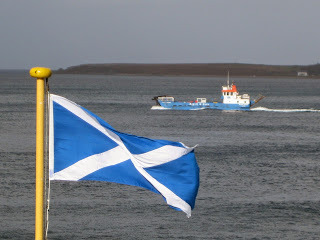
There are also radical, left-wing arguments for a No vote. The pro-independence left has high hopes, stirring rhetoric and uplifting visions. Its radical wing is a raft lashed together from the wreckage of three (at the last count) far-left sects. The anti-independence left has page after page of dry facts and figures about ownership, finance, manufacturing, EU laws, employment patterns, energy production, and political and social attitudes. Its radical wing comes from the mainstream left of the labour movement.
The Red Paper group of academics, activists and trade unionists has gone into the details of Scotland's political and economic situation, and published a substantial body of evidence and argument that an independent Scotland would have even less 'control over its own affairs' than it has now, for the obvious reason that the big economic and political decisions would continue to be made outside it. The argument is concisely put by Tom Morrison in today's Morning Star. More of the broad (and some of the narrow) left case along these lines can be found at Socialism First.
The sociologist and media analyst Greg Philo has investigated social consciousness and attitudes north and south of the Border, and found little to cheer about. The prospect of a decade (at least) of bickering and blaming between a newly independent Scotland and an embittered and inward-looking rUK, with national differences deepening by the day, is a grim one for left or even liberal politics.
Ben Jackson, editor of the social-democratic journal Renewal, has published a fascinating analysis of The Political Thought of Scottish Nationalism (PDF), and a cutting and critical account of Alec Salmond's political journey, one that should give pause to those who've turned to the SNP in disappointment with Labour.
All this may be irrelevant to the outcome. Labour lawyer Ian Smart argues (from hard-won experience as an election foot-slogger) that debates, speeches and public meetings serve to enthuse your own side, not to convince the other. All the No campaign has to do, he says, is keep hammering away at the inadequacies of the SNP/Yes campaign, and get out the vote.
As he also likes to remind us, there is no room for complacency. I agree, but like him I still think the outcome will be No. If I'm wrong I'll accept that I'm living in the early days of a worse nation, and continue to work as if I lived in the early days of a better one.
Within the left Yes camp there are plenty of choices and voices: the broadly progressive, the Scandinavian-style social democratic, the artistic and creative, and the radical. There are others linked to on my sidebar, and at these sites yet more links. Uniting the political and cultural nationalist left is Bella Caledonia, a site difficult for me to evaluate because I can't read much of it without feeling sick.
There's a conservative case for the union of Scotland and England, ably articulated by (e.g.) Adam Tomkins and more plangently by Simon Schama. For those of us to the left of these scholars there's a lot to disagree with or question in their arguments, and much to consider -- depending on how much importance you attach to the mere material condition of the working class, which on any reckoning will take a big hit from a split. The official Better Together campaign argues along likewise conservative lines. It gets a lot of flack from the Yes side for being negative, a good indicator that being negative works.

There are also radical, left-wing arguments for a No vote. The pro-independence left has high hopes, stirring rhetoric and uplifting visions. Its radical wing is a raft lashed together from the wreckage of three (at the last count) far-left sects. The anti-independence left has page after page of dry facts and figures about ownership, finance, manufacturing, EU laws, employment patterns, energy production, and political and social attitudes. Its radical wing comes from the mainstream left of the labour movement.
The Red Paper group of academics, activists and trade unionists has gone into the details of Scotland's political and economic situation, and published a substantial body of evidence and argument that an independent Scotland would have even less 'control over its own affairs' than it has now, for the obvious reason that the big economic and political decisions would continue to be made outside it. The argument is concisely put by Tom Morrison in today's Morning Star. More of the broad (and some of the narrow) left case along these lines can be found at Socialism First.
The sociologist and media analyst Greg Philo has investigated social consciousness and attitudes north and south of the Border, and found little to cheer about. The prospect of a decade (at least) of bickering and blaming between a newly independent Scotland and an embittered and inward-looking rUK, with national differences deepening by the day, is a grim one for left or even liberal politics.
Ben Jackson, editor of the social-democratic journal Renewal, has published a fascinating analysis of The Political Thought of Scottish Nationalism (PDF), and a cutting and critical account of Alec Salmond's political journey, one that should give pause to those who've turned to the SNP in disappointment with Labour.
All this may be irrelevant to the outcome. Labour lawyer Ian Smart argues (from hard-won experience as an election foot-slogger) that debates, speeches and public meetings serve to enthuse your own side, not to convince the other. All the No campaign has to do, he says, is keep hammering away at the inadequacies of the SNP/Yes campaign, and get out the vote.
As he also likes to remind us, there is no room for complacency. I agree, but like him I still think the outcome will be No. If I'm wrong I'll accept that I'm living in the early days of a worse nation, and continue to work as if I lived in the early days of a better one.
Published on May 13, 2014 12:36
April 24, 2014
From the archives of Atlantis
To review the memoir of an activist who lived well to the left of official Communism is usually to begin with an apology for its subject's obscurity, and for the difficulty of explaining to the average reader the weight given in the text to storms in teacups and brawls in backstreets. All the more so when the activist concerned was a leading member of an organization usually (though in this case imprecisely) referred to as Trotskyist.
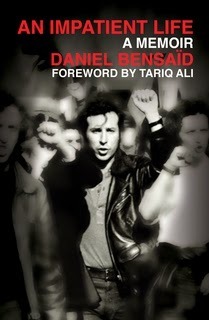 No such apology is needed for Daniel Bensaid's An Impatient Life (Verso, 2013). Quite the contrary. At the time of his untimely death in 2010 Bensaid was France's best-known Marxist public intellectual, and his cast includes a surprising number of names known even in Britain. Many of his minor characters went on to achieve remarkable things in intellectual, cultural or political life, not only in France (and not only on the left). His major arguments are about questions that concern us all, or should. The events he lived through, from the Algerian War of Independence through May 1968 to the rise of a new anti-capitalism and a new Latin American left, continue to shake the ground we walk on. The personal element is related with an eye for the telling detail, the sore spot and the tender touch that would credit a good novelist.
No such apology is needed for Daniel Bensaid's An Impatient Life (Verso, 2013). Quite the contrary. At the time of his untimely death in 2010 Bensaid was France's best-known Marxist public intellectual, and his cast includes a surprising number of names known even in Britain. Many of his minor characters went on to achieve remarkable things in intellectual, cultural or political life, not only in France (and not only on the left). His major arguments are about questions that concern us all, or should. The events he lived through, from the Algerian War of Independence through May 1968 to the rise of a new anti-capitalism and a new Latin American left, continue to shake the ground we walk on. The personal element is related with an eye for the telling detail, the sore spot and the tender touch that would credit a good novelist.
Nonetheless, Tariq Ali is right to say in his foreword that 'Reading much of this material today is like delving into the archives of Atlantis.' (The foreword is followed by an eleven-page list of abbreviations.) Sebastian Budgen, who kindly sent me this review copy, has written an informative and moving overview of Bensaid's life for fellow Atlanteans.
For those unfamiliar with that world beneath the waves, two aspects of Bensaid's memoir may stand out. The first is the remarkable structure: almost every chapter begins with a personal recollection, stage by stage from childhood on, and expands into an erudite theoretical reflection that brings us sharply to the present -- in fact to our present, beyond the narrator's death. From love to Leninism, journalism to Jewishness, Bensaid always has something interesting and original to say.
The second is the truly amazing range of individuals and events that were influenced and affected by the activists and actions noted and footnoted on Bensaid's pages. For anyone interested in the recent past, it's a sustained series of surprising revelations of how the world was in fact changed from the one Bensaid was born in to the one we live in. If we want to change it further, we have a lot to learn from Bensaid's unrepentant self-criticisms.
 No such apology is needed for Daniel Bensaid's An Impatient Life (Verso, 2013). Quite the contrary. At the time of his untimely death in 2010 Bensaid was France's best-known Marxist public intellectual, and his cast includes a surprising number of names known even in Britain. Many of his minor characters went on to achieve remarkable things in intellectual, cultural or political life, not only in France (and not only on the left). His major arguments are about questions that concern us all, or should. The events he lived through, from the Algerian War of Independence through May 1968 to the rise of a new anti-capitalism and a new Latin American left, continue to shake the ground we walk on. The personal element is related with an eye for the telling detail, the sore spot and the tender touch that would credit a good novelist.
No such apology is needed for Daniel Bensaid's An Impatient Life (Verso, 2013). Quite the contrary. At the time of his untimely death in 2010 Bensaid was France's best-known Marxist public intellectual, and his cast includes a surprising number of names known even in Britain. Many of his minor characters went on to achieve remarkable things in intellectual, cultural or political life, not only in France (and not only on the left). His major arguments are about questions that concern us all, or should. The events he lived through, from the Algerian War of Independence through May 1968 to the rise of a new anti-capitalism and a new Latin American left, continue to shake the ground we walk on. The personal element is related with an eye for the telling detail, the sore spot and the tender touch that would credit a good novelist. Nonetheless, Tariq Ali is right to say in his foreword that 'Reading much of this material today is like delving into the archives of Atlantis.' (The foreword is followed by an eleven-page list of abbreviations.) Sebastian Budgen, who kindly sent me this review copy, has written an informative and moving overview of Bensaid's life for fellow Atlanteans.
For those unfamiliar with that world beneath the waves, two aspects of Bensaid's memoir may stand out. The first is the remarkable structure: almost every chapter begins with a personal recollection, stage by stage from childhood on, and expands into an erudite theoretical reflection that brings us sharply to the present -- in fact to our present, beyond the narrator's death. From love to Leninism, journalism to Jewishness, Bensaid always has something interesting and original to say.
The second is the truly amazing range of individuals and events that were influenced and affected by the activists and actions noted and footnoted on Bensaid's pages. For anyone interested in the recent past, it's a sustained series of surprising revelations of how the world was in fact changed from the one Bensaid was born in to the one we live in. If we want to change it further, we have a lot to learn from Bensaid's unrepentant self-criticisms.
Published on April 24, 2014 04:31
March 30, 2014
Events for April
I have two events at the Glasgow literary festival AyeWrite!. The first, on Friday 4 April, is a panel in memory of Iain Banks, with reminiscences and readings by me, Ron Butlin, and other friends of Iain.
4 Apr 2014 6:00 P.M - 7:00 P.M at the Mitchell Library
The second, on Thursday 10 April, is a conversation between me and Robert Shearman (Dr Who writer, horror writer, former Writer in Residence on the MA Creative Writing course, and all-round good guy) on what the future holds and the present conceals.
10 Apr 2014 6:00 P.M - 7:00 P.M at the Mitchell Library
The following week, I'm giving a two-hour workshop at the Edinburgh Science Festival, on The Science in your Science Fiction: How to get it right. It'll cover inspiration, research, the dark arts of infodumping and incluing, and much else, and will conclude with a not-too-scary writing exercise.
Date: 16 April 2014, starting at 6 pm at the National Library of Scotland. Suitable for ages 14 and up, it costs £10 / £8.
4 Apr 2014 6:00 P.M - 7:00 P.M at the Mitchell Library
The second, on Thursday 10 April, is a conversation between me and Robert Shearman (Dr Who writer, horror writer, former Writer in Residence on the MA Creative Writing course, and all-round good guy) on what the future holds and the present conceals.
10 Apr 2014 6:00 P.M - 7:00 P.M at the Mitchell Library
The following week, I'm giving a two-hour workshop at the Edinburgh Science Festival, on The Science in your Science Fiction: How to get it right. It'll cover inspiration, research, the dark arts of infodumping and incluing, and much else, and will conclude with a not-too-scary writing exercise.
Date: 16 April 2014, starting at 6 pm at the National Library of Scotland. Suitable for ages 14 and up, it costs £10 / £8.
Published on March 30, 2014 01:51
March 28, 2014
World-Building the Real World
Last week there was a brief flurry of interest in a 'NASA study' that predicted the collapse of civilization. The study turned out not to be by NASA and to be founded on eight equations. This sort of thing makes soothsaying look solid.
A global industrial civilization has never existed before, and while highly interdependent it seems to contain enough redundant links to make it resilient. A lot of horrible things could happen, but it would go on. Some civilizations do go on for thousands of years. China and Egypt spring to mind, but even Europeans could just about get away with claiming that the Roman Empire is still around, and they're living in it. That said, there are imaginable if unlikely events that could knock over civilization across a wide area or even the world without necessarily wiping everyone out. A limited nuclear war or an unstoppable plague or an asteroid impact or a big coronal mass ejection could kill billions and still leave millions of survivors struggling to cope.
 Most of them wouldn't have a clue what to do. A precondition of an advanced industrial civilization is a very fine-grained division of labour. This makes astonishing achievements routine, but necessarily leaves everyone involved a little vague about the details of what everyone else does. The premise of Lewis Dartnell’s new book, The Knowledge, is that it’s a manual for the survivors of a disaster that wiped out 90% of humanity but left the infrastructure basically intact. What would they need to know in order to survive and start again?
Most of them wouldn't have a clue what to do. A precondition of an advanced industrial civilization is a very fine-grained division of labour. This makes astonishing achievements routine, but necessarily leaves everyone involved a little vague about the details of what everyone else does. The premise of Lewis Dartnell’s new book, The Knowledge, is that it’s a manual for the survivors of a disaster that wiped out 90% of humanity but left the infrastructure basically intact. What would they need to know in order to survive and start again?Dartnell starts his thought experiment with ‘the grace period’ in which there are still useful supplies to be got from the cities, and goes on through rebooting agriculture, food and clothing, medicine, mining, manufacturing, transport, electricity, communications, chemistry … and so on, all the way to ‘the greatest invention’: science itself. At each step, he uses his attention-grabbing premise to make the mundane details of how to make everything from bread to soap to cement to steel interesting and interconnected. I didn’t know that a lathe is a sort of von Neumann machine, or that retrieving at least one long-threaded screw from the ruins is crucial. The conclusion is inspiring, the guide to further reading gives due recognition to post-apocalyptic SF, and the bibliography can keep you reading until the asteroid comes.
I can see this book becoming a manual for writers of post-apocalyptic SF and historical fiction, steampunk and the like, but far more important is its relevance to the rest of us in understanding how the world we live in actually works.
I was sent an advance proof for comment, and I’ve just received a fine hardback with my quote on the back: ‘This is the book we all wish we’d been given at school: the knowledge that makes everything else make sense.’ True to my word, that copy’s going to the nearest high school library. But I’ll buy the paperback and keep it in easy reach, and in a safe place.
Published on March 28, 2014 07:26
March 14, 2014
Impending commemorations
This Saturday afternoon (March 15) I'm at Huddersfield Literary Festival, for a Celebration of the Life and Works of Iain Banks. I'll be on for a half-hour talk on the poetry of Iain Banks, followed by a panel with John Jarrold and David Barnett about Iain's contribution to SF. Details.
Next Thursday (March 20) at 6.30 pm I'm giving a short welcome and talk at the opening of the University of Stirling's Iain Banks exhibition.
Next Thursday (March 20) at 6.30 pm I'm giving a short welcome and talk at the opening of the University of Stirling's Iain Banks exhibition.
Published on March 14, 2014 10:53
March 8, 2014
Links
Here's a Scottish Book Trust podcast in which I talk with Ryan Van Winkle about Descent. Kirsty Logan and Tim Sinclair are on before me, also talking about their new books.
I have a review of The Science Fiction Handbook, edited by Nick Hubble and Aris Mousoutzanis (Bloomsbury, 2013) in the Morning Star. Basically I outline the history of SF criticism as I understand it and then heartily recommend the book, which I have read and have already started lending to students.
Published on March 08, 2014 05:12
March 4, 2014
Descent launch at Blackwell's
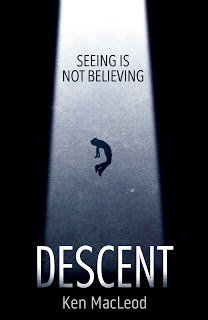
My novel Descent (UK/ANZ/Amazon UK/ sample here) is being launched at Edinburgh's fine bookshop Blackwell's on Thursday 6 March.
Details:
Date: Thursday 6th March
Time: 6.30pm
Venue: Blackwell’s Bookshop, 53-62 South Bridge, Edinburgh, EH1 1YS
I'll be reading from the novel and answering questions and generally talking about it. I've described Descent as being 'about flying saucers, hidden races, and Antonio Gramsci's concept of passive revolution, all set in a tale of Scottish middle class family life in and after the Great Depression of the 21st Century. Almost mainstream fiction, really.'
The event finishes at 8 pm, and no doubt discussion will continue in one or more of the local pubs.
This event is ticketed, but tickets are FREE. Tickets are available from the front desk at Blackwell’s Bookshop or by phoning 0131 622 8218
For more information or if you would like a signed copy please contact Ellie Wixon on
0131 622 8222 or ellie.wixon@blackwell.co.uk
Published on March 04, 2014 04:28
Ken MacLeod's Blog
- Ken MacLeod's profile
- 762 followers
Ken MacLeod isn't a Goodreads Author
(yet),
but they
do have a blog,
so here are some recent posts imported from
their feed.



